
Agriculture Must Shift From ‘Green Revolution’ To ‘Green Methods’, Says Economic Survey
India has to focus on resource efficiency in smallholder farms to meet the sustainable development goals to end poverty and usher in inclusive growth.
One of the features of this year’s economic survey, tabled in the Parliament on Thursday, is that the government, finally, is coming around to the view that the agricultural landscape has to undergo tremendous transformation and shift from “green revolution” to “green methods” led by sustainability.
Expressing concern over the decline in the size of landholdings, the survey said India has to focus on resource efficiency in smallholder farms to meet the sustainable development goals to end poverty and usher in inclusive growth. A combination of resource-efficient methods, dynamic cropping patterns, farming responsive to climate change and intensive use of Information Communication and Technology (ICT) should be the backbone of smallholder farming in India. The survey elaborated on “green methods” seen as key to “safe and a food-secure future”.
What the survey recommends is to use environmentally-friendly automated farm machinery tools suited to small and marginal farmers. Pointing out that small and marginal farmers constitute over 85 per cent of the total growers in the country, the survey recommended that customised hiring centres (CHCs) could be set up to promote the use of high-tech machinery for mechanisation of small and marginal farm holdings. This could be considered especially for difficult terrains.
Between 2014-15 and 2017-18, the centre had set up 8,162 CHCs under the Sub-Mission on Agricultural Mechanisation Scheme. Terming that ICT applications are crucial in smallholder farming, the survey said that the spread of mobile phones in rural areas has helped small and marginal farmers get better access to information on soil health, weather and price.
Adoption of ICT will help improve market access for farmers, facilitate financial inclusion and contribute to early warning signals that are critical to the development of small and marginal farmers. Technology can help bridge information gaps in agricultural markets. The use of block chain technology by the Coffee Board is helping coffee growers realise better prices.
The survey said farmers’ access to markets can be improved through better connectivity to terminals or mandis nearby. It would enable farmers fetch better prices. It called for enhancing rural infrastructure to improve connectivity and for ICT to provide timely information on prices, aggregation and storage facilities, which can help small farmers overcome marketing bottlenecks.
Stating that there has been an increasing trend in expenditure on agricultural research and education as a percentage of total gross value added in agriculture, the survey said that the year 2017-18 was, however, an exemption.